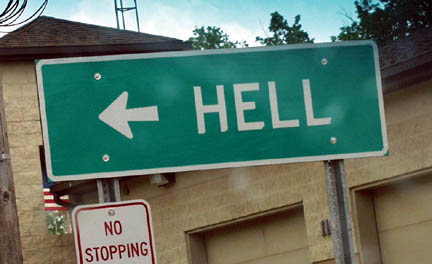Sunday 17 Spetember 2006 is the Global Day for Darfur.
While a great deal of activity is proposed for this day to draw attention to the criminally under-reported situation in the region, I sense that there is a shortage of ideas about what to do about the situation itself.
At the public meeting organised by the Euston Group last week, some of the ideas – especially those proposed by the Aegis Trust, like boycotting produce from the Sudan, writing to one’s MP and protesting to the Sudan embassy – would, in my opinion, be limited in their effectiveness. A government this shameless cannot be shamed into acting (or not acting, as the case may be) and the economic pressure of a boycott most likely will be felt by the farmers, not the corrupt politicians transferring hard currency by the suitcase full into European banks.
Did the collapse of the Zimbawean economy stop Robert Mugabe’s shopping sprees in Paris and Rome, for example?
That is not to say that symbolic gestures can’t be galvenised into a wider and more effective programme of action. They are important as a component of consciousness building, which is perhaps the first step to something more concrete.
But, what’s next? What needs to be done on Monday the 18th and beyond?
Peter Tatchell has some ideas, which I present now for discussion.
Last year, Tatchell helped organise a “die-in” outside Downing Street in which 250 Darfurian refugees and some supporters participated.
Tatchell proposed the following programme of action:
- Enforce a no-fly zone over Darfur to halt the Sudanese bombing of African villages
- Send into Darfur a 15,000-strong UN peace-keeping force to protect the civilian population and aid workers, keep the warring factions apart, and disarm the militias
- Provide food, clothing, shelter and medical care to the victims of the conflict, and provide the refugees with assistance to leave the camps, return to their homes and rebuild their lives and communities
- Impose sanctions against the Sudanese government leaders and the leaders of the Janjaweed militia, including an arms embargo and arraignment before the International Criminal Court on charges of war crimes, torture and crimes against humanity
“Darfur is a needless, preventable humanitarian tragedy, caused by the complacency and inaction of the UK government, the African Union, the United Nations, and the European Union. The international community has Darfur’s blood on its hands,” said Tatchell.
More controversially, Tatchell ascribes the lack of action on the Left to the fear of being branded “Islamophobic”.
“The threat of being labeled “Islamophobic” is inducing a new wave of moral paralysis, as evidenced by the way most leftists ignore the role of fundamentalist Islam in the genocide in the Darfur region of Sudan, where racist Islamists are exterminating the black African population.”
Of course, this is fear is neither insubstantial or unsubstatiated. Ian Donovan wrote in “What Next?” journal (edited by Bob Pitt of Islamophobia-Watch notoriety). Criticising Harry’s Place, the Alliance for Workers Liberty, and the Communist Party of Great Britain for supporting Tatchell, Donovan wrote:
“What these opportunists did not print, however, or even mention or criticise, was Peter Tatchell’s public call for Iraq-style sanctions against Sudan, and for a blue-helmeted, United Nations imperialist armed force to invade that country and “sort out” the communal conflict and ethnic cleaning that is going on in Darfur. As everyone knows, this would mean the US and its allies under another flag, as in the Korean and 1991 Gulf Wars,” said Donovan.
No wonder they had no ideas to save the lives of the 400 000 now dead and a million more waiting to die.
Once again, sections of the Left give priority to Muslim oppressors at the expense of the Muslim victims of that oppression. Let us be clear: what is happening in Sudan has nothing to do with religion, and everything to do with racism and racial supremacy. Arab Islamists are “ethnically cleansing” black Africans – most of whom are also Muslims (but Muslims of the wrong race).
But there is no need for us to be paralysed by this poison. Wearing a blue hat on Sunday must be a start to a robust plan of action. Argument is better than silence, so let the debate begin.
Gene adds: I’ve posted before about the Sudan divestment movement in the US, which has succeeded in getting a number of state pension funds and university endowment funds to drop their investments in companies doing business in Sudan. (US companies are barred from doing business directly in Sudan, although I’m sure some manage to keep their hands in anyway.)
